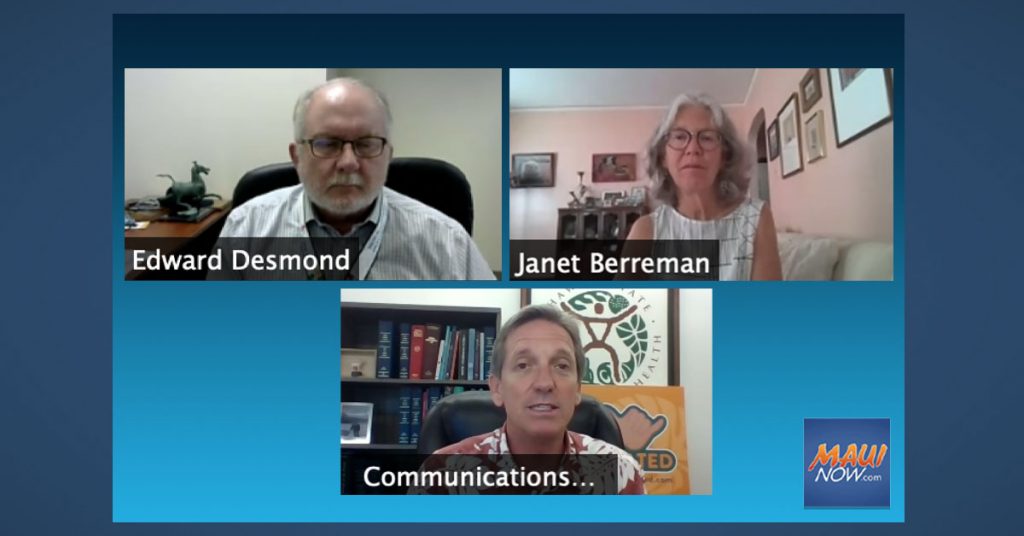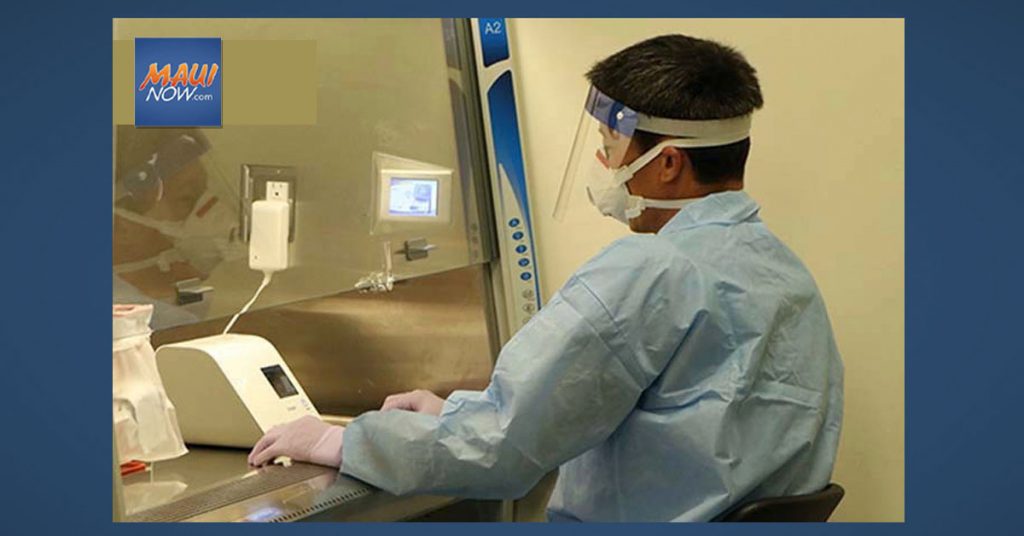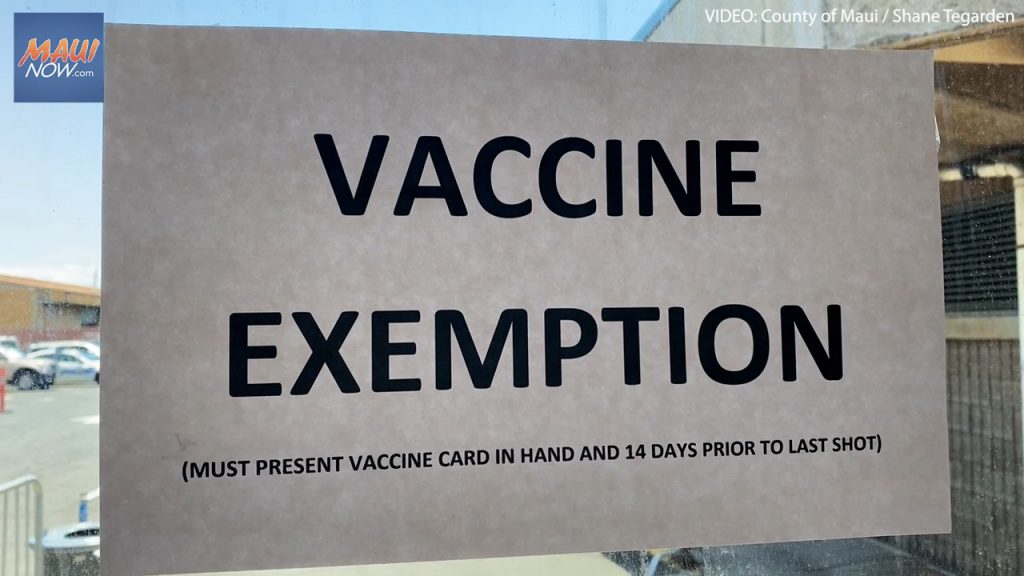Hawai‘i DOH: “Delta” Variant Expected to Become Dominant Strain in a Month

Doubling Projected Every Two Weeks
The Delta variant of the COVID-19 virus is expected to double every two weeks, and will likely become the dominant variant in the islands in about a month or so, according to Hawai‘i Department of Health State Laboratories Division Administrator Dr. Edward Desmond.
The information was based on a sampling released this week, and shared during a Department of Health press briefing on Friday. It also comes amid news that the Delta variant is now present in all four major counties within the state.
On Thursday, a molecular biologist in charge of genome sequencing for the state reported a batch of 45 results came back with confirmation of nine additional Delta variant cases in the islands in just one week, bringing the state’s total to 13 cases. That’s a positivity rate for the SARS-CoV-2 variant B.1.617.2 of around 18%.
“The pattern has been on the mainland US and in other places where the Delta variant has been introduced, it tends to double the percentage of cases every two weeks or so; and that’s what I expect. Right now it’s something like 18% of cases, so I think that if it follows the pattern of the mainland, then in about two weeks from now it would be double that,” said Dr. Desmond.
To date, nine cases of Delta variant, have been detected on O‘ahu, two on Maui, one on Kaua‘i and one on Hawai‘i island.
There is a delay from when samples are collected and tested. The specimens that were collected and tested in this latest batch of 45–were collected between May 31 and June 10, somewhere between 3-4 weeks ago.
“Typically it’s something like three weeks… It’s really a pretty small sample size to make predictions about what the percentage is of each variant,” Dr. Desmond said, noting that the laboratory usually tests 75-100 specimens per week. “That represents a pretty significant percentage of the positive specimens in the state–just really enough to give us a look at the picture of the overall distribution of strains. You see an increasing number of cases. I think we can really continue to monitor the situation and the distribution of variants with the sampling size that we have and the testing capacity we currently have… it gives us a pretty good look at what’s going on,” said Dr. Desmond.
The batch sampling also confirmed: 11 cases of the B.1.1.7 strain, also known as the Alpha variant that was first detected in the UK; and 11 cases the P.1 or Gamma variant, first identified in Brazil.

Should we be worried?
“Each time we’ve detected a new variant in our state, I think all of us feel a surge of concern and maybe anxiety. And then we in the health department get the question–what do we need to be concerned about, or how concerned do we need to be?” said Kaua‘i District Health Officer Dr. Janet Berreman.
“The Delta variant is actually one that is even more concerning, although for similar reasons, than some of the other variants. It appears to be much more transmissible, even than the earlier variants that were also more transmissible than the original strain. It’s also the first one for which we had some preliminary indication that it may cause more severe disease,” said Dr. Berreman. “Obviously when we have a virus that spreads more easily and can make people sicker, those are real reasons to be concerned about this virus and about keeping it under control in our community.”
In contrast to where we were six or eight months ago, Dr. Berreman said, “we have really good news about this variant–which is that even though it’s probably the most concerning one we’ve detected, it is still very much prevented by the available vaccinations.”
While most cases involve non-vaccinated individuals, at least one of the nine new cases involved a “possible vaccine break through” according to Dr. Desmond.
“What we know is that you are much less likely to transmit the virus to other people, but it does not mean that you cannot do so,” Dr. Berreman said of people who are vaccinated but contract the virus. “So even if you’ve been vaccinated, if you test positive for the COVID-19 virus, you need to be isolated and the health department will direct you to isolate and assist you with doing that for the full period, just the same as if you had not been vaccinated, because although you pose a lower level of risk, you still have some level of risk, and we do know there are vulnerable people out there.”
Health officials say they still believe that vaccination is the number one defense. “So we know that none of our vaccines are 100%, but people who are fully vaccinated are much less likely to become sick with any of the variants, including the Delta variant. They are also, even if they do become sick, as some people will–if you’re fully vaccinated, you are very unlikely to have severe disease or need to be hospitalized, and you’re also much less likely to transmit that virus to other people–even to people who live with you in your household,” said Dr. Berreman.
“To me, the answer to the question of: ‘Should we be worried,’ is–yes. We should be worried about this virus and it is spreading quickly in our state as we expected it to do. But we can take that worry and move it into action to really effectively slow that spread and protect all of us–and that’s by getting vaccinated if we haven’t already been,” said Dr. Berreman.

How the Variant Arrived, and How it’s Spreading
When asked about the arrival of variants and their eventual spread, health officials say, “The only way for new viruses to get to our state is by travel… but then once it’s here, especially with this very highly transmissible Delta viral variant, then it can spread within our community without any additional travel.”
According to Dr. Berreman, “We know that a single test three days before you travel here does not 100% guarantee that you won’t bring disease into the island because the disease has an incubation period of 2-14 days. So if you’re tested three days before you travel and you get exposed after that, your test will be negative, but you an still be exposed before you travel here on vacation or come home here, if you’ve been away on vacation, and introduce disease into our state.”
Effective July 8, people will be able to travel here from the mainland without a test–if the are fully vaccinated. That’s the date that the state anticipates reaching a 60% full vaccination rate.
“It’s really not opening to all tourists from all places under all conditions. It’s opening to people who are fully vaccinated–and frankly, fully vaccinated travelers are the ones who pose the lowest risk to us, and we need our tourism industry for the economic well-being which we know is really tied closely to people’s health. When I think we look at it on a balance, it remains a responsible decision because our population will be highly vaccinated and the people for whom we are making it easier to travel here are precisely those low-risk travelers whom we would most like to welcome,” said Dr. Berreman.
Health officials say they will continue to monitor case counts, test rate positivity, hospitalization utilization and all other factors that they have been tracking for over a year, and will continue to provide guidance to the governor and legislative leaders.
Precautions Heading into the Holiday Weekend
Heading into a holiday weekend when people are going to gather, the same things that are higher risk for any strain of COVID-19, are at high risk for Delta, health officials said.
“So gatherings with lots of people, especially if people are not wearing masks, especially if they’re very close together or indoors or there’s poor ventilation, and especially if people are unvaccinated–all of those things increase risk and in those settings there will be even greater spread of the Delta variant than others,” said Dr. Berreman. “So in looking at holiday celebrations, people should continue to be cautions along all of those lines.”

How Much Protection is Meaningful?
Health officials say there’s a difference between how much protection is hoped for, and how much protection is meaningful to any given individual and to a population.
“Of course we would like a vaccine to provide 100% protection against everything, but that’s not true of any vaccine we have for any disease. And all of these vaccines, even against the Delta variant, are highly, highly effective, and are respective of vaccines that we routinely use, that we rely upon to keep populations health,” said Dr. Berreman.
“As I’ve said before, even if you get sick with the Delta variant or other COVID variant, and you’ve been fully vaccinated, chances of serious illness or having to be hospitalized or even in rare cases, having a fatal outcome, all of those are much, much diminished, and the likelihood that you will spread the disease to someone else is also much diminished. So if the choice is between a vaccine that’s not 100% but still prevents severe disease and hospitalizaiton, that seems to me at least to be a much better choice than no vaccine and risking disease with increased risk of transmission, and possibly increased risk of severe disease,” she said.
“Because of the rapidity at which this variant spreads, and the rapid doubling that Dr. Desmond referred to, it’s really important, not only for people who have not been vaccinated to be vaccinated, but that they don’t delay being vaccinated–because every additional week is a chance for this virus to take hold even more strongly in our community and spread even more quickly. So time is really of the essence in getting as many people as we can vaccinated in order to really slow the spread of this particular variant,” said Dr. Berreman.
Maui Maui Michael Victorino said health officials continue to monitor the situation in Maui County and across the state. “They are looking at contact tracing, and looking at it and making sure that these cases are being monitored. I trust that the people at the Department of Health are going to do a good job, and I ask everyone– we are not out of the woods yet–to please, wear your mask, even if you’re fully vaccinated. I do. I’m not ashamed to wear it. And keep physical distancing and practice good hygiene. Vaccination is the number one, but we can also supplement that with other mitigating means.”










